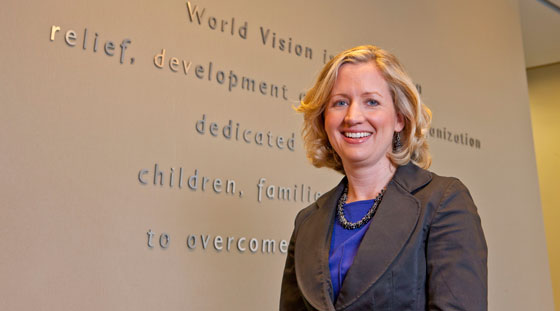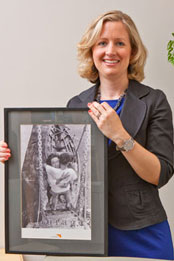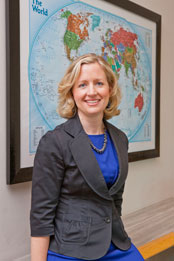Sara Austin (BA’98): Child Rights Champion
 As historic moments go, it was one Sara Austin (BA’98) wouldn’t have missed for the world.
As historic moments go, it was one Sara Austin (BA’98) wouldn’t have missed for the world.
It was February 28, 2011, and she was in Geneva to witness the signing into law of the United Nations Optional Protocol to the Convention on the Rights of the Child. Now, children around the world could finally get help from the UN when their rights were being violated. And it was Austin who played a key role in making it happen.
“There are no words to describe it,” says the current Director of the President’s Office of World Vision Canada of the experience. “To go from writing the dissertation at Oxford University, to watching the UN Human Rights Council pass it into law, was awe-inspiring.”
Although nearly six years had passed since Austin started working on that dissertation, part of her Master’s degree in International Human Rights Law, her journey to the UN really began in Toronto many years before that. It was 1979, and her parents had decided to host a family of refugees from Laos. Though only four-years-old at the time, she says it was a pivotal moment in her life.
“My parents cultivated a strong alignment in me and my brother between our Christian faith and how we lived. Taking in and caring for people in need was a natural thing, and my interest in social justice and compassion for people really took off from there.”
It wasn’t long before Austin was volunteering with her family at local soup kitchens and helping them deliver Christmas presents to families in need. In high school, she was organizing World Vision 30-Hour Famine fundraisers and encouraging classmates to get involved. Austin was taking an interest in the well-being of her community and the world. She was also discovering her passion: children’s rights.
“Every individual has something important to contribute. That includes children. They have a voice, something important to say, and need to be heard.”
A voice of her own
 Austin was still finding her own voice when she arrived at Dalhousie in 1994 to study marine biology. “That was my aspiration in high school,” she explains. “The university had a really great program, so I applied.”
Austin was still finding her own voice when she arrived at Dalhousie in 1994 to study marine biology. “That was my aspiration in high school,” she explains. “The university had a really great program, so I applied.”
Yet, one year into her studies, Austin realized her passion and skills were not quite suited for the sciences. She switched to International Development Studies (IDS) and Women’s Studies programs for her second year. “That’s when everything aligned. Dalhousie was a tremendous building block for my career. The professors were phenomenal and encouraged me to think about how my training would impact people beyond the university. The opportunity to spend a semester at the University of Cuba through a pilot program for IDS students further drove the desire to connect my academic studies with life for people living in poverty. Dalhousie launched me into the work of international development, human rights and humanitarian aid, and it was from there that I moved on to World Vision.”
Initially, Austin focused on international development. But an interest in advocacy and government relations, fueled in part by her involvement in Dalhousie’s student union, led her to enroll in the Oxford program. Designed for professionals, it was a mix of distance and onsite courses, which meant two summers studying in Oxford’s hallowed halls. While there, she began writing her dissertation, determined that it would not gather dust on a shelf.
“I was looking for an opportunity to advance child rights law. The UN had conventions in place that secured children’s rights, but there was nothing to hold governments accountable to these international laws. I saw this as a huge gap, but also saw the chance to address it.’
Once the dissertation was complete, Austin turned to her World Vision and other NGO colleagues to help bring it to life. Gradually, a coalition formed, with Austin as co-chair. In 2006, she presented the idea to the UN Committee on the Rights of the Child. As she recalls, that first meeting did not go very well.
“The committee rejected it, which was disappointing. But we decided not to give up. Children were the only human rights group that did not have access to such a tool. We continued to meet with the UN committee, with government representatives in Geneva, and with governments in capital cities worldwide. I was convinced that it would work. We just had to be persistent.”
Making an impact
 Thanks to Austin’s vision and persistence, the new Optional Protocol was signed. Now the coalition, under new leadership, is working to have ten governments ratify it so it goes into effect. Austin is assisting in that effort. She’s optimistic that will happen by the end of 2013. After that, the coalition will work to encourage more countries to opt in, and to raise awareness of the law among children and the agencies that represent them around the world. It may be years before we see the true impact of this undertaking, but Austin believes it will be significant.
Thanks to Austin’s vision and persistence, the new Optional Protocol was signed. Now the coalition, under new leadership, is working to have ten governments ratify it so it goes into effect. Austin is assisting in that effort. She’s optimistic that will happen by the end of 2013. After that, the coalition will work to encourage more countries to opt in, and to raise awareness of the law among children and the agencies that represent them around the world. It may be years before we see the true impact of this undertaking, but Austin believes it will be significant.
“Say a child has been denied healthcare or education based on their gender or ethnicity. That child can go to the UN, have their voice heard and, based on the UN’s decision, benefit from having the situation rectified. But it can also result in changes to government policies or laws that benefit children in similar circumstances.”
She pauses for a moment: “When I finally see a child or group of children receive a remedy for their rights being violated, that will be an incredible thing.”
Update: Sara Austin was named to the Top 25 Women of Influence ranking in the NGO category. Read more »